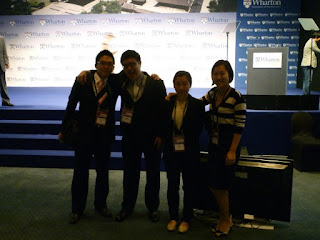 The second day of the Forum opened with a keynote address by Choongsoo Kim, the Governor of the Bank of Korea. He briefly described the state of the Korean economy during and after the financial crisis, and the monetary and fiscal policies that were enacted to induce quick recovery of the economy.
The second day of the Forum opened with a keynote address by Choongsoo Kim, the Governor of the Bank of Korea. He briefly described the state of the Korean economy during and after the financial crisis, and the monetary and fiscal policies that were enacted to induce quick recovery of the economy.The next keynote speech was by Yungro Yun, Chairman and CEO of Industrial Bank of Korea. I always thought that Industrial Bank was government-owned and operated, and was not aware of the fact that IBK manages finances for mostly small and medium enterprises (SMEs). Yun said that the rapid recovery of the Korean economy can be attributed to the fact that SMEs were given priority when it came to government assistance during the financial crisis. (SMEs are approximately 85% of businesses in Korea)
The keynote speeches were followed by another panel discussion, and this time, I attended 'New Economic Leadership of Asia.' The panelists were Taesik Ahn, the dean of SNU's Business School, Junichi Endo, Snr VP of Nissan, Charles Tseng, President of Korn/Ferry Int'l Asia Pacific, and Ken Yun, CEO of Samjong KPMG. This was, by far, the best discussion, and numerous topics ranging from social responsibility to education were discussed. Dr Ahn focussed on business education reform, which aims to nurture more ethical and socially responsible businesspeople. Although his philosophy is true and justified, a lot of what he said was very abstract and he neglected to provide specific directions for the future. For example, he argued that 'greed' is largely responsible for the recent financial crisis, and that the way to distinguish 'self-interest' from 'greed' needs to be taught not only at business schools but also at home. Throughout his speech, the same question kept popping into my head: 'HOW?' Most students and parents wish to be compensated for the fortunes they paid on expensive business school education with high income upon graduation. I, for one, feel this way, although I resent the popular stereotype of avaricious and competitive business school students.
Endo's proposed technological improvement, innovation and free trade as important factors that will allow Asia to rise as a new economic leader of the world. On the other hand, Tseng talked about financial reforms. The last speaker was Ken Yun, who stressed the importance of social responsibility. I really appreciated his choice of topic and was very impressed with the way he incentivizes his employees to focus on vision as opposed to compensation. One particular statement he made was so effective and it has not left my head since. It goes: "You cannot succeed in a society that fails." Yun emphasized the need to seek collective welfare and amend socially irresponsible actions. If Asia wants to become the next leader of the global economy, we must think of a way to educate such values and to reform our financial, educational and technological systems.
The final event of the Forum was Master Class teachings by Wharton Faculty. I decided to attend a class called 'Is Africa Good for Asia?' I was looking forward to learning about political and economic exchanges between Africa and Asia, but was disappointed because too much time was spent discussing and justifying corruption. Nevertheless, it was a great opportunity for me to experience how a master class is taught and run, and Prof Nichol's stories of his expeditions in Africa were fascinating.
No comments:
Post a Comment